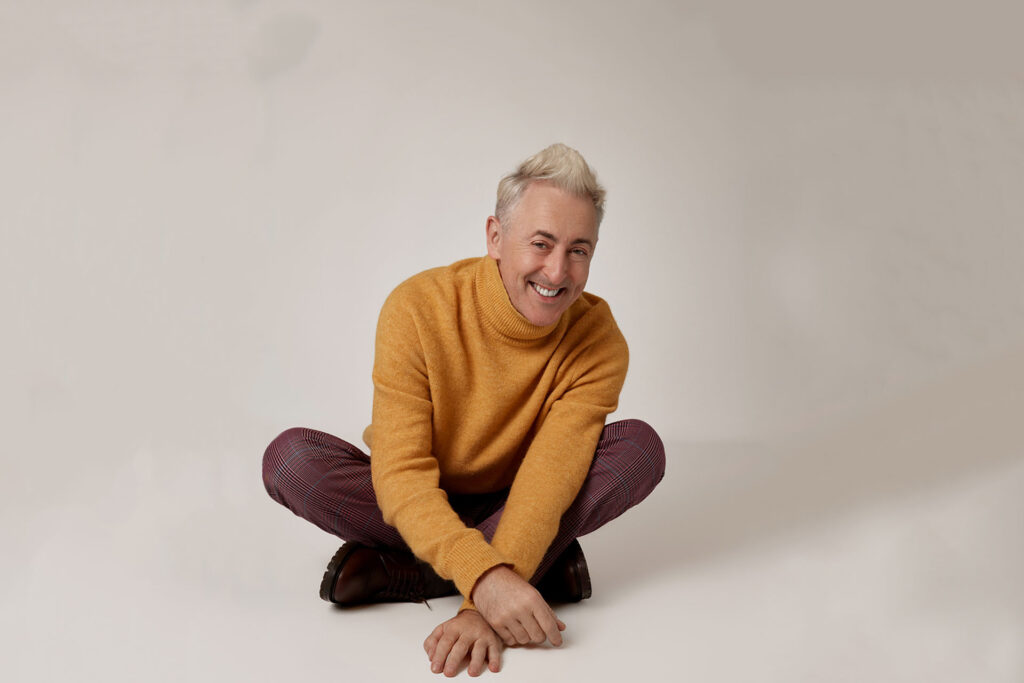The Hollywood and Broadway star reconnects with his inner child at his longtime home in the Catskills. The play’s the thing, Indeed.
By Kevin Sessums
Photography by Mike Ruiz
I was sitting in a parking lot of a McDonald’s outside Asheville, NC, when I got the call from Alan Cumming. If San Francisco and Santa Fe had done mushrooms together, made mad love and decided to keep the rather marvelous child that resulted—that would be Asheville. If Sean Connery and Judy Carne had done so, that would be Cumming—or maybe if Miriam Margolyes and Ian McKellen had—for Cumming is a chameleon nestled rather nicely, thank you, within his being an actor, singer, writer, club owner, television host, world traveler and political activist. Asheville, itself chameleon-like, is nestled in the Blue Ridge Mountains and is more smoked salmon these days than its neighboring Smokies yet retains a countercultural 1960s vibe. Think the Catskills skewed more toward Woodstock than Hudson or either of the Chathams, yes, nestled between them. It is imbued, as Cumming is himself, with musicality and artistic endeavors with a whiff of an old hippie about it and the durability of the Dionysian.
“I thought you were going to be at this photoshoot where I am in New York to do this interview,” he told me that day I was waiting in the car in that parking lot with my sister’s wife while my sister was inside the McDonald’s getting herself a Dr Pepper. Cumming wasn’t in any sort of diva-mode—he never unnecessarily is—but was just a bit confused since this is a man who sticks unerringly to an invariably busy schedule. I apologized profusely for any mix-up and explained that I was in the Blue Ridge Mountains having just come from an LGBTQ pride festival in a tiny North Carolina mountain hamlet surprisingly filled with drag queens, some of whom looked a lot like Dolly Parton who grew up a mountain range over, and what appeared to be a gaggle of druids and goddess-celebrating radical faeries rather heroic in their hedonism so freely displayed in such a place, the latter reminding me a bit of Cumming when he’s in his own mountain mode. I told him that. He laughed. And we scheduled a Zoom call the next week when he’d be in his East Village apartment in New York, and I’d be staying at the Mary Heaton Vorse House in Provincetown under the auspices of the Provincetown Arts Society. “I was just in Provincetown last week with Grant,” he said, mentioning his husband, artist Grant Shaffer, before his being called back to the photoshoot.
Cumming, a sweetheart of a man, and his sweetheart of a husband have a home in the western Catskills where they retreat when they are craving privacy, which is itself a creatively camp endeavor in their shared life. In fact, he and that other mountain lover, Dolly Parton, have managed to maintain a sweetheart swagger that so many stars lose when their stance in the show business world enlarges to a loping lack of grace as they grub about for more and more success and power. Dolly has certainly been a mountainous version of America’s sweetheart for decades now and I’d audaciously add “America’s sweetheart” to that earlier litany of public roles in Cumming’s life. The more conventional versions over the years have been curated from the ranks of Julia Roberts and June Allyson and Jennifer Aniston and Doris Day and Tom Hanks and Debbie Reynolds and Timothée Chalamet and Meg Ryan and Mary Tyler Moore and Taylor Swift. America’s first sweetheart was Mary Pickford who was born in Canada and was known as the “girl with the curls.” Cumming was born in Scotland and because of his anti-circumcision activism is known as the guy with the foreskin.
Too audacious? I don’t think so. Alan Cumming has naturalized audacity in the same way he has become a naturalized American citizen—with equal measures of panache and knowing and a grin-laden likability. He’s grown from the Emcee in Cabaret and Eli Gold in The Good Wife and its sequel The Good Fight to a silver-tongued éminence grise of downtown Manhattan and Upstate New York who emanates both a homey and homie openhearted welcome to those who need to feel as if they truly are. There’s diplomacy in his crossover appeal, a directness and empathy that he learned at his own knee when he was a boy navigating the wilds of Scotland and the wilder violent moods of an alcoholic father. A survivor’s sagacity limns his more impish impulses that give them a wrinkle of wryness, even a twinkle of it. He’s the quick-witted Puck, Oberon’s fairy henchman, if they—which I think of as Puck’s pronoun—had steeped themself in a kind of humane stoicism along with their choice bits of poetic mischievousness. It’s an interesting combination, the fairly humane affixing itself to a fairy’s humor, and really rather, well, OK, becoming.
That stoicism was part of the now 58-year-old actor’s moving Upstate 22 years ago. “When you could get out of the city the Saturday after 9/11, I went with a friend who had a place in the Catskills,” he tells me. “The land next to him was for sale. I thought, ‘Oh, God I need this.’ I had never understood why people said, ‘Oh, I have got to get out of the city.’ I had always just thought: ‘Why?’ Why would you want to leave on a weekend back when I was in my honeymoon phase with New York. Well, I’m still in my honeymoon with it really. But then I got it with 9/11 in the way that the pandemic more recently made lots of people think about living outside the city. It made me realize I wanted an escape. So, I bought the land. It was a week to the day after 9/11. I have built on it over the years, other cabins and things. It’s more like a compound now.”
“Or a camp?” I ask.
“I quite like that. A camp. Compound always sounds like that place in Waco, Texas, where they all got blown up.”
“Plus, camp has a double entendre aspect to it,” I tell him.
“There’s Club Cumming,” he says, this merry wanderer of the night, mentioning his combination bar and cabaret space and dance hall in the East Village. “Hmmm… Camp Cumming. Yes, I quite like that. The place Upstate is my total sanctuary. It feels very much like the terrain I grew up in as a little boy in Scotland. It’s a great intensive way to see your friends. You can do everything with them—yet at the same time I want them to have their privacy, too. I learned from going to stay with people how lovely it is to have time with them but also to have your own time and be able to escape to a guest house or whatever. I’ve been adding to it. I now have a tree house you can sleep in. There are lots of childlike things about the place,” he muses and agrees when I say that he’s not trying to recreate his childhood, but to reconfigure it. “Definitely. When my brother came to visit the first time he said, ‘You bought your childhood.’ I think he’s right. When you grow up you don’t really appreciate your surroundings and you certainly don’t appreciate how bucolic things are ’til you go away, and you realize it. But my childhood was also tainted with my dad, so I sort of just rejected everything about it—the countryside and my connections to nature and the outdoors. But as I’ve grown older I have realized I love those things. I loved growing up in the middle of nowhere. I loved not having to lock the doors. I loved being in a storm in the middle of the woods. All that stuff—to walk out and see no one. Especially now with the way my life is, it means so much to me to have that privacy and sanctuary. I even have a camera on the house looking out at the view that is connected to my phone and I put it on sometimes just to look at it even when I’m not there.”
Cumming takes out his phone and pulls up the view. He holds the phone’s screen up to the Zoom camera so I too can bask in it, a trampoline in the distance awaiting his need to jump and tumble about. Does he perhaps see too there in a temporal distance his retiring to this cherished refuge Upstate? “I think so. The pandemic for so many people was life changing. Grant and I spent a good six solid months up there. It was magical. I had one of the most magical years of my life during it. We both sort of rebooted the time we spend in the city and the time we spend up there. We spend much more time Upstate since then. Since the pandemic I’ve done things like taking a month off. I took July off. I’m taking December off. I actually just want to have more time to myself. I suppose retiring is just a big version of that. But if you’re an actor, you can sort of semi-retire and just do less. I don’t want to say that I never want to work again. I can’t imagine that. I don’t really consider my work work. It just sort of feels like my hobby.”
“You had to grow up very quickly as a boy when dealing with the trauma of being raised by a violent father. In some ways you have evolved into a childhood,” I say, trying out the theory.
“I do feel like I have sort of lived my life backwards,” he says.
“You’re your own version of Merrily We Roll Along,” I tell him. “You’d be great in either of those male lead roles in that Sondheim musical now back on Broadway. Just putting it out there.”
Cumming chuckles at the prospect of another Broadway run of eight shows a week in his future, then turns back to his childhood. “I had to understand adult things when I was very little. I am nearly 59 and I still get boyish and puckish and childlike, so I realize there is something in my spirit and in my demeanor that comes across like that. I like that about myself. That means you’re open to life and adventure and you’re not afraid—maybe to my detriment sometimes. I have retained some of the qualities I wasn’t allowed to have or had the space to enjoy when I was very little.”
“You say you’re not afraid now. But did you have fear as a boy? Or were you just angry—is that where you placed the emotional need to survive?”
“When I was little I wasn’t mad. I was just, yes, surviving and living with fear, the fear of what was going to happen with my father exploding and getting violent. I genuinely feel aside from dying the worst things that could happen to me in my life have happened—unless I get kidnapped and horribly tortured. I think that is why Grant and I are such a good match. He is a bit more anxious and worries about things I would never worry about.”
Cumming bought the Upstate property when he was with someone else but then they split up as he was building it. It was a massive project to get completed on his own with its array of cottages and a pool, etc. “I remember going there on my own to the house when it was finished but completely empty—it smelled so beautiful with all the lovely wood—and just bursting into tears thinking, ‘Oh, my God. I’ve now got this beautiful home and now I’m on my own.’ I felt it was the end of this long odyssey and my life was in a bit of a mess. Shortly after that I had a party—half a housewarming party and half a Fourth of July one—and one of the people who came to that party was Grant. So, Grant and I got together at that house. It has been such a special thing for us both. We have a big, strong connection to the house because we got together there. The style of the house was to be welcoming and to be open to people and to life, and the first thing to happen there was meeting Grant. I had made this amazing place for myself—this cocoon—and then someone came along and was able to be happy in it.”
I tell Cumming that when he called me at the McDonald’s that day down in North Carolina that I was visiting my sister and her wife who live a cocooned nomadic life in an RV much like the RV that he and Miriam Margolyes drove around in the travel show, Lost in Scotland. “If you were driving Miriam around in that RV Upstate in a version called Lost in the Catskills, what would you want to show her?”
“Hmm… I once went to the Delaware county fair. I went with Murray Hill,” he says, mentioning the comedian and drag king performer. “We had such a laugh. I had never known anything like it. It was completely unlike anything I had grown up with. There was a demolition derby. This was what was so crazy. It was sold out. I mean, you could not get into it. I had to get my publicist to call up and get me in. We got seats, but they were very, very bad. There was a big burly man sitting next to me. I didn’t really know what was going on and couldn’t understand the rules, so I was asking him questions. He was a bit gruff with me. But later on, there was an intermission, and he came back with his beer, and he said, ‘I want to apologize. I didn’t mean to be rude when you were asking me questions, but I didn’t have my teeth in.’”
“Where did he have them? In his pocket?”
“I guess he didn’t have them with him and went to get them during the intermission. But I loved the demolition derby. Loved it. And the things that people eat there were incredible. Those big, gigantic cakes that are sort of fried. Hmm. What else? I would love to take Miriam skiing. Or tubing. I love tubing. That is such fun. I prefer tubing down a ski slope to skiing actually. There is a place in Phoenicia you can go tubing down a river when it’s warmer. That’s such fun, too. There are so many things to do that are fun. But we kind of go there and hide. I mean, I go to the shops and the farmers market but mostly we keep to ourselves.” Does he feel famous when he’s there or is it a place he goes to feel less so? “I do feel famous there. What is nice is that I’m aware that people get it that I don’t go there to be famous. I try not to do show bizzy things there. I do try to help with the local community where I can help, of course. But I kind of keep the famous ‘Alan Cumming’ out of the way. It is just something you have to factor into your life wherever you happen to be. I do love the western Catskills because it doesn’t feel as if I’m going to bump into people and it feels more removed. You walk down the street in Hudson, and you run into someone you might know, and they go, ‘Oh, Alan, hi,’” he says, his voice growing plumy with how pleased it sounds to itself. “‘I was going to send you a script.’ The western Catskills feel a little more sleepy. Not sleepy. Gentle. That’s the word: gentle.”












Comments are closed.